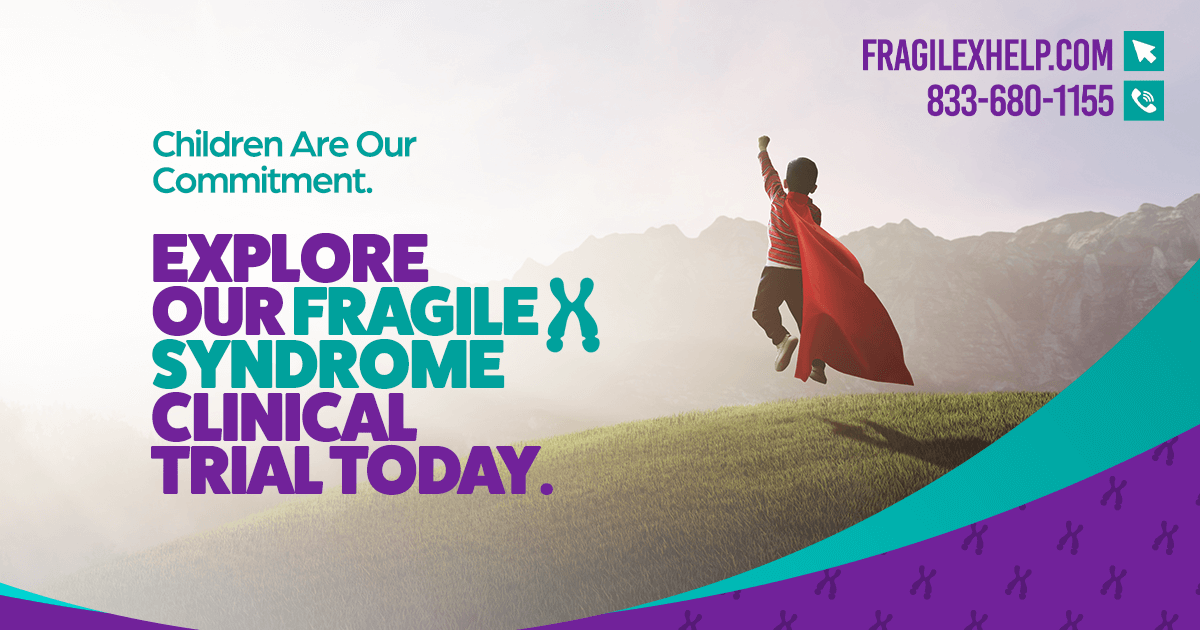Parents, caregivers and healthcare providers who care from individuals with Fragile X syndrome (FXS) may ask “why is the RECONNECT trial with ZYN002 is being conducted?” and “how can I learn more about participating?”.
ZYN002 is an investigational pharmaceutically-manufactured (not from a plant) cannabidiol (CBD) gel. ZYN002 is formulated as a permeation-enhanced clear gel, designed to provide CBD into the bloodstream through the skin. ZYN002 is provided at individual doses significantly higher than available in over-the-counter CBD products. It is import to know that ZYN002 does not contain THC.
The RECONNECT trial is designed to assess the potential impact of ZYN002 on behavioral symptoms of FXS. RECONNECT is currently enrolling children, adolescents and young adults ages 3 to < 23 years. The age range has recently been increased to 22 years based upon feedback from FXS experts.
RECONNECT is designed to confirm results of the first randomized, double-blind, placebo-controlled trial of ZYN002 conducted in FXS, CONNECT-FX. The results of CONNECT-FX were recently published in the Journal of Neurodevelopmental Disorders with Dr. Elizabeth Berry-Kravis as the lead author who was joined by Dr. Randi Hagerman, Dr. Dejan Budimirovic, Dr. Craig Erickson, Dr. Honey Heussler, Dr. Nicole Tartaglia, Dr. Jonathan Cohen and Dr. Flora Tassone. The CONNECT-FX trial found that ZYN002 was well tolerated in patients with FXS and demonstrated efficacy with a favorable benefit risk profile in patients with ≥90% methylation of the FMR1 gene, in whom gene silencing is most likely, and the impact of FXS is typically most severe. The article can be accessed online at the Journal of Neurodevelopmental Disorders at https://rdcu.be/c0sKz.
While statistical significance for the primary endpoint of improvement in Social Avoidance was not achieved in the full group of children and adolescents, significant improvement was demonstrated in participants with ≥90% methylation of FMR1 (nominal p=0.020), representing 80% of the overall study population. This group also achieved statistically significant improvements in Caregiver Global Impression-Change in Social Avoidance and Isolation, Irritable and Disruptive Behaviors, and Social Interactions (nominal p-values: p=0.038, p=0.028, and p=0.002, respectively). Similar results were seen in participants with 100% methylation of FMR1, representing 65% of the study population. ZYN002 was generally well tolerated. All treatment-emergent adverse events (TEAEs) were mild or moderate. The most common treatment-related TEAE was application site pain (ZYN002: 6.4%; placebo: 1.0%).
A paper describing why CBD may have a benefit in FXS was also recently published in the Journal of Neurodevelopmental Disorders. The paper is entitled, “Role of the Endocannabinoid System in Fragile X Syndrome: Potential Mechanisms for Benefit From Cannabidiol Treatment”. This paper reviews evidence suggesting a central role for the endocannabinoid system (ECS) in neuronal development and cognitive function in FXS, and the potential role of CBD as a treatment for FXS. The article can be accessed online at the Journal of Neurodevelopmental Disorders at https://rdcu.be/c25fu.
FXS is caused by deficiency or absence of the FMR1 protein, FMRP. The absence of FMRP disrupts ECS signaling. The ECS helps maintain neuronal function and signaling and is thought to be disrupted in FXS. CBD may help restore the function of the ECS in FXS according to a review of data to date. CBD may also act as an agonist on serotonin 5HT1A and other receptors which may contribute to beneficial effects in people with FXS.
Taken together, the information in these publications provide support for conducting RECONNECT. If the results of RECONNECT are positive, Zynerba Pharmaceuticals will submit a New Drug Application in the U.S. and Marketing Authorization Application in the EU for use of ZYN002 in individuals with FXS. If approved by the US FDA and the European Medicines Agency, ZYN002 will be made available by prescription for use in appropriate individuals with FXS.
RECONNECT, like all clinical trials in individuals with FXS, cannot be completed without the commitment of parents, caregivers and healthcare providers to enroll their children or patients in the trials.
You can make a difference by enrolling your child, adolescent or young adult in the RECONNECT trial.
Learn much more about the trial and contact the RECONNECT team through the MyFXSResearch Portal.
A review of study visits, what to expect and answers to commonly asked questions are provided.
learn more
Study: Examining Factors that Influence Expectations for Individuals with an Intellectual or Developmental Disability (IDD)
Dr. Grace Francis from George Mason University is conducting an online survey to explore factors that affect the expectations for individuals with intellectual or developmental disabilities (IDD), including Fragile X syndrome (FXS), after they finish school.
Study: Identifying Translational Sleep Biomarkers in Autism
The Manoach Lab at Massachusetts General Hospital is conducting a research study to explore brain activity during sleep and sensory processing in individuals living with Fragile X syndrome (FXS).




